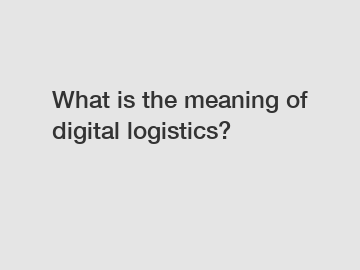What is the meaning of digital logistics?
What is the meaning of digital logistics? - Unveiling the Potential.
Digital logistics has become a hot topic in the rapidly evolving world of supply chain management. With the advent of advanced technologies and the rising demand for faster, more efficient processes, companies are increasingly embracing digital logistics to streamline their operations and gain a competitive edge. But what exactly is the meaning of digital logistics, and how does it revolutionize the way goods are transported and managed? Let's delve into this intriguing concept and explore its various dimensions.
1. Defining digital logistics:

Digital logistics refers to the utilization of digital technologies, such as artificial intelligence, machine learning, the Internet of Things (IoT), robotics, and big data analytics, to optimize and enhance the efficiency of logistics management processes. It involves the digitization of traditionally manual tasks like order processing, inventory management, transportation, and delivery, bringing about increased visibility, improved decision-making, and reduced costs.
2. Enhanced visibility and real-time tracking:
One of the key benefits of digital logistics is the ability to achieve comprehensive visibility across the entire supply chain. Through real-time data and analytics, companies can track the movement of goods from the point of origin to the final destination. This end-to-end visibility enables proactive planning, mitigates risks, and allows for swift responses to any disruptions or delays. With accurate data at their disposal, logistics professionals can make informed decisions and optimize their operations.
3. Optimized inventory management:
Effective inventory management is crucial for any business. Digital logistics enables companies to optimize inventory levels by accurately forecasting demand, analyzing historical data, and implementing automated replenishment systems. With smarter inventory management, companies can reduce costs associated with overstocking or stockouts. By integrating inventory management systems with other digital technologies, such as RFID or barcode scanners, businesses can achieve seamless synchronization and eliminate manual errors.
4. Efficient transportation and delivery:
Digital logistics transforms the traditional transportation and delivery processes by introducing advanced technologies. Route optimization algorithms consider various factors, such as traffic conditions, weather, and fuel consumption, to determine the most efficient routes for delivery vehicles. Real-time tracking of shipments enables logistics providers to anticipate potential delays, reroute vehicles, and keep customers informed about the status of their orders. Moreover, automated delivery systems, such as drones or autonomous vehicles, are being explored to further enhance the speed and accuracy of logistics operations.
5. Harnessing big data analytics:
In the era of digital logistics, data is a valuable asset. Through big data analytics, companies can extract meaningful insights from vast amounts of data generated during the entire supply chain process. These insights can be utilized to identify patterns, optimize operations, and predict demand. For instance, historical data combined with market trends can help companies adjust their inventory levels, production schedules, and distribution strategies. By harnessing the power of big data, companies can generate actionable intelligence and stay ahead of the competition.
In conclusion, digital logistics is revolutionizing the world of supply chain management by leveraging advanced technologies to optimize and enhance logistics processes. Through enhanced visibility, real-time tracking, optimized inventory management, efficient transportation, and the harnessing of big data analytics, companies can gain a competitive edge in the fast-paced business landscape. Embracing digital logistics enables businesses to achieve greater efficiency, reduce costs, respond effectively to disruptions, and ultimately exceed customer expectations. As the digital age progresses, companies need to explore and embrace the potential of digital logistics to remain agile, innovative, and successful.
If you are looking for more details, kindly visit advanced e-commerce parcel logistics software, cloud-based parcel delivery system, advanced cloud delivery management software.


